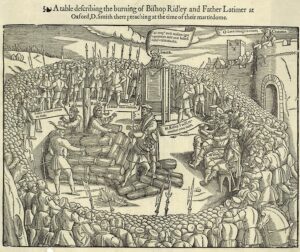
On this day in history, the 16th October 1555, during the reign of Mary I, Hugh Latimer and Nicholas Ridley were burnt at the stake in Oxford. The two men, along with Thomas Cranmer, who was burnt at the stake on the 21st March 1556, are known as the Oxford Martyrs and their lives and deaths are commemorated in Oxford by Martyr’s Memorial, a stone monument just outside Balliol College and near to the execution site, which was completed in 1843.
Hugh Latimer was appointed Bishop of Worcester in 1535 but was forced to resign his bishopric in 1539 when he opposed Henry VIII’s Six Articles. He went on to become the Court Preacher during the reign of Edward VI and was chaplain to Catherine Brandon (née Willoughby), the Duchess of Suffolk. His Protestant beliefs led to him being tried and imprisoned during the Catholic Mary I’s reign and subsequently burnt at the stake.
Nicholas Ridley became one of Archbishop Thomas Cranmer’s chaplains in 1537 and became vicar of Herne, Kent, in 1538. He served as one of the King’s Chaplains in 1540-41 and was made Master of Pembroke College. He was accused of heresy in 1543 but managed to escape punishment and was made Bishop of Rochester in 1547 and then Bishop of London in 1550. He helped his good friend, Cranmer, with the Book of Common Prayer in 1548 and was also a member of the commission who tried Stephen Gardiner and Edmund Bonner in 1549. Ridley is known for his clashes with John Hooper, a reformer who had lived in Zurich in exile during Henry VIII’s reign. In July 1553, after the death of Edward VI, Ridley signed letters patent confirming that Lady Jane Grey was Queen and went on to preach a sermon at St Paul’s Cross on the 9th July 1553 proclaiming that Mary and Elizabeth were bastards. He was imprisoned when Mary I proclaimed herself Queen and was tried for heresy and burnt at the stake.
I will leave you with John Foxe’s description of the burning of Latimer and Ridley:-
“Dr. Ridley, the night before execution, was very facetious, had himself shaved, and called his supper a marriage feast; he remarked upon seeing Mrs. Irish (the keeper’s wife) weep, “though my breakfast will be somewhat sharp, my supper will be more pleasant and sweet.”
The place of death was on the north side of the town opposite Baliol College:—Dr. Ridley was dressed in a black gown furred, and Mr. Latimer had a long shroud on, hanging down to his feet. Dr. Ridley, as he passed Bocardo, looked up to see Dr. Cranmer, but the latter was then engaged in disputation with a friar.—When they came to the stake, Dr. Ridley embraced Latimer fervently, and bid him be of good heart. He then knelt by the stake, and after earnestly praying together, they had a short private conversation. Dr. Smith then preached a short sermon against the martyrs, who would have answered him, but were prevented by Dr. Marshal, the vice-chancellor. Dr. Ridley then took off his gown and tippet, and gave them to his brother-in-law, Mr. Shipside. He gave away also many trifles to his weeping friends, and the populace were anxious to get even a fragment of his garments. Mr. Latimer gave nothing, and from the poverty of his garb, was soon stripped to his shroud, and stood venerable and erect, fearless of death.
Dr. Ridley being unclothed to his shirt, the smith placed an iron chain about their waists, and Dr. Ridley bid him fasten it securely; his brother having tied a bag of gunpowder about his neck, gave some also to Mr. Latimer. Dr. Ridley then requested of Lord Williams, of Fame, to advocate with the queen the cause of some poor men to whom he had, when bishop, granted leases, but which the present bishop refused to confirm. A lighted fagot was now laid at Dr. Ridley’s feet, which caused Mr. Latimer to say, “Be of good cheer, Ridley; and play the man. We shall this day, by God’s grace, light up such a candle in England, as, I trust, will never be put out.” When Dr. Ridley saw the flame approaching him, he exclaimed, “Into thy hands, O Lord, I commend my spirit!” and repeated often, “Lord receive my spirit!” Mr. Latimer, too, ceased not to say, “O Father of heaven receive my soul!” Embracing the flame, he bathed his hands in it, and soon died, apparently with little pain; but Dr. Ridley, by the ill-adjustment of the fagots, which were green, and placed too high above the furze was burnt much downwards. At this time, piteously entreating for more fire to come to him, his brother-in-law imprudently heaped the fagots up over him, which caused the fire more fiercely to burn his limbs, whence he literally leaped up and down under the fagots, exclaiming that he could not burn; indeed, his dreadful extremity was but too plain, for after his legs were quite consumed, he showed his body and shirt unsinged by the flame. Crying upon God for mercy, a man with a bill pulled the fagots down, and when the flames arose, he bent himself towards that side; at length the gunpowder was ignited, and then he ceased to move, burning on the other side, and falling down at Mr. Latimer’s feet over the chain that had hitherto supported him.
Every eye shed tears at the afflicting sight of these sufferers, who were among the most distinguished persons of their time in dignity, piety, and public estimation. They suffered October 16, 1555.”
Sources
- Actes and Monuments (Foxe’s Book of Martyrs), John Foxe, p232
- Wikipedia pages on Hugh Latimer and Nicholas Ridley
